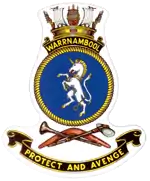HMAS Warrnambool (FCPB 204)
HMAS Warrnambool (FCPB 204), named after the city of Warrnambool, Victoria, was a Fremantle-class patrol boat of the Royal Australian Navy (RAN).
| History | |
|---|---|
| Namesake | City of Warrnambool |
| Builder | NQEA, Cairns |
| Laid down | 30 September 1978 |
| Launched | 25 October 1980 |
| Commissioned | 14 March 1981 |
| Decommissioned | 29 November 2005 |
| Motto | "Protect and Avenge" |
| Honours and awards | Three inherited battle honours |
| Fate | Scrapped |
| Badge |  |
| General characteristics | |
| Class and type | Fremantle class patrol boat |
| Displacement | 220 tons |
| Length | 137.6 ft (41.9 m) |
| Beam | 25.25 ft (7.70 m) |
| Draught | 5.75 ft (1.75 m) |
| Propulsion | 2 MTU series 538 diesel engines, 3,200 shp (2,400 kW), 2 propellers |
| Speed | 30 knots (56 km/h; 35 mph) |
| Range | 5,000 nautical miles (9,300 km; 5,800 mi) at 5 knots (9.3 km/h; 5.8 mph) |
| Complement | 22 |
| Armament |
|
Design and construction
Starting in the late 1960s, planning began for a new class of patrol boat to replace the Attack class, with designs calling for improved seakeeping capability, and updated weapons and equipment.[1] The Fremantles had a full load displacement of 220 tonnes (220 long tons; 240 short tons), were 137.6 feet (41.9 m) long overall, had a beam of 24.25 feet (7.39 m), and a maximum draught of 5.75 feet (1.75 m).[2] Main propulsion machinery consisted of two MTU series 538 diesel engines, which supplied 3,200 shaft horsepower (2,400 kW) to the two propeller shafts.[2] Exhaust was not expelled through a funnel, like most ships, but through vents below the waterline.[3] The patrol boat could reach a maximum speed of 30 knots (56 km/h; 35 mph), and had a maximum range of 5,000 nautical miles (9,300 km; 5,800 mi) at 5 knots (9.3 km/h; 5.8 mph).[2] The ship's company consisted of 22 personnel.[2] Each patrol boat was armed with a single 40 mm Bofors gun as main armament, supplemented by two .50 cal Browning machine guns and an 81 mm mortar,[2] although the mortar was removed from all ships sometime in the late 1990s. The main weapon was originally to be two 30-mm guns on a twin-mount, but the reconditioned Bofors were selected to keep costs down; provision was made to install an updated weapon later in the class' service life, but this did not eventuate.[4][3]
Warrnambool was built by NQEA, Cairns.[2] The ship was laid down on 30 September 1978, launched on 25 October 1980, and commissioned into the RAN on 14 March 1981.[5]
Fate
Warrnambool was decommissioned on 29 November 2005.
The patrol boat was broken up for scrap in Darwin during 2006 and 2007, at a cost of $450,000 to the Australian government.[6]
Citations
- Mitchell, Farewell to the Fremantle class, p. 105
- Gillett, Australian and New Zealand Warships since 1946, p. 89
- Gillett, Australian and New Zealand Warships since 1946, p. 88
- Jones, in Stevens, The Royal Australian Navy, p. 222
- Moore, Jane's Fighting Ships 1985–86, p. 26
- Australian National Audit Office (5 February 2015), Management of the Disposal of Specialist Military Equipment (Report), Government of Australia, p. 63, retrieved 24 April 2015
References
- Gillett, Ross (1988). Australian and New Zealand Warships since 1946. Brookvale: Child & Associates. ISBN 0-86777-219-0. OCLC 23470364.
- Jones, Peter (2001). "Towards Self Reliance". In Stevens, David (ed.). The Royal Australian Navy. The Australian Centenary History of Defence (vol III). South Melbourne: Oxford University Press. ISBN 0-19-555542-2. OCLC 50418095.
- Mitchell, Brett (2007). "Farewell to the Fremantle Class". In Forbes, Andrew; Lovi, Michelle (eds.). Australian Maritime Issues 2006 (PDF). Papers in Australian Maritime Affairs. Sea Power Centre. ISBN 978-0-642-29644-3. ISSN 1327-5658. Archived from the original (PDF) on 13 June 2011. Retrieved 12 May 2010.
- Moore, John, ed. (1985). Jane's Fighting Ships 1985–86. London: Janes Information Services. ISBN 0-7106-0814-4.